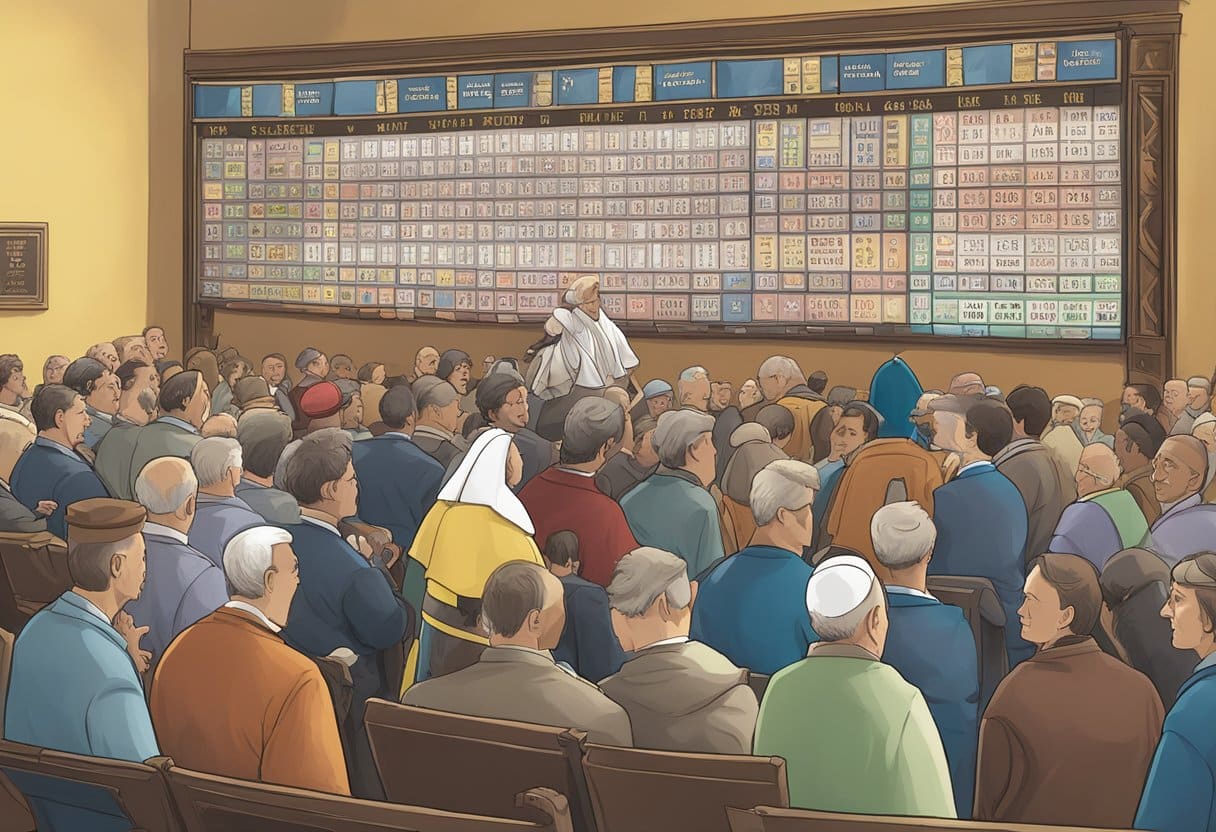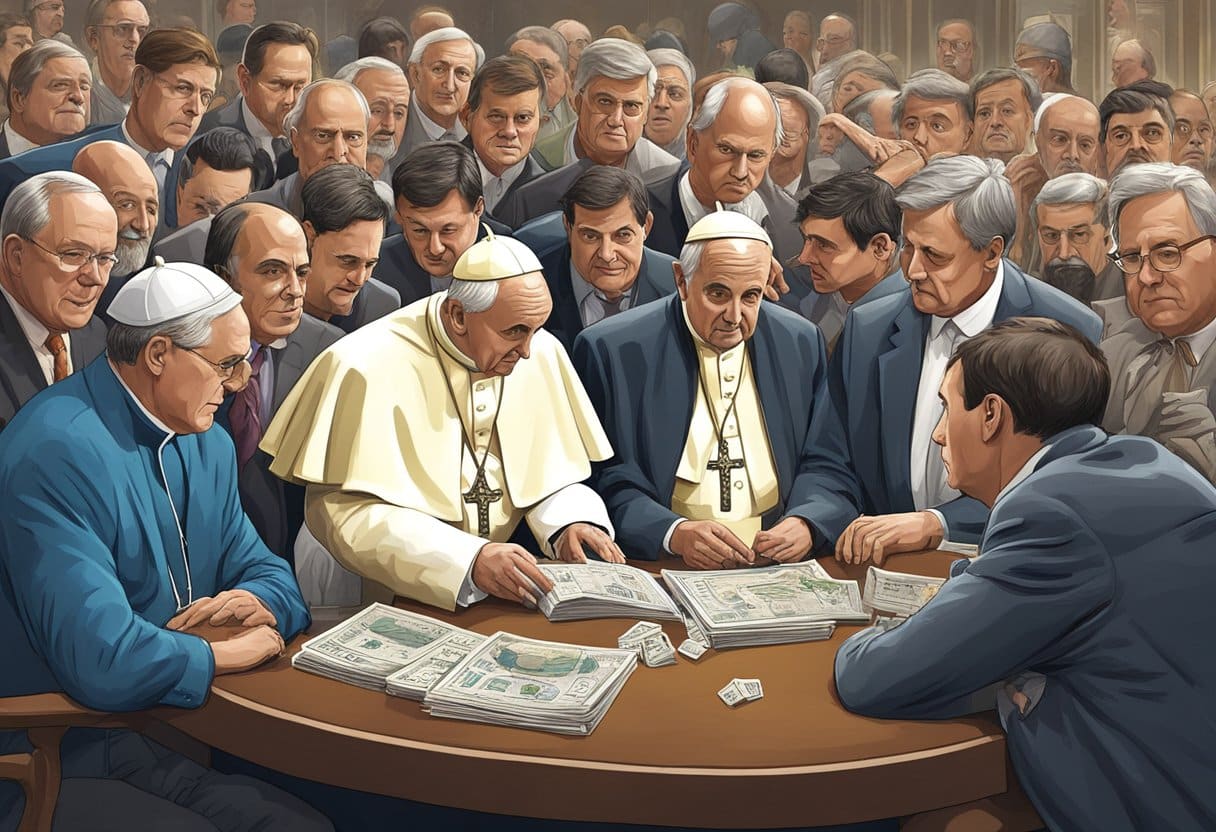As Pope Francis continues his leadership, gambling markets are already speculating on who might eventually take his place. Betting sites have created odds for potential successors, with Vatican Secretary of State Cardinal Pietro Parolin emerging as the clear favorite at approximately +225 odds (roughly 2-1). The betting markets currently favor three main candidates: Pietro Parolin, Luis Antonio Tagle from the Philippines, and Italian Cardinal Matteo Maria Zuppi.

The gambling frenzy surrounding papal succession shows how even religious events attract betting interest. Cardinal Tagle holds the second position with +300 odds, while Cardinal Zuppi follows at +600. These odds reflect gambling markets’ analysis of various factors including age, background, theological positions, and current Vatican influence of each potential candidate.
While gambling on religious matters might seem unusual, betting markets often provide interesting insights into public perception. Millions of dollars are currently being wagered on this ecclesiastical question, with platforms like Polymarket showing significant activity. The actual conclave that will eventually choose the next pope involves complex considerations beyond what odds might suggest.
Understanding the Papal Conclave

The Papal Conclave is the secret assembly of cardinals that elects a new pope. This ancient and sacred process combines religious tradition with strict protocols to ensure a legitimate succession for the leadership of the Catholic Church.
How the Papal Conclave Works
When a pope dies or resigns, cardinals under 80 years old gather in Vatican City to elect his successor. The process begins with cardinals taking an oath of secrecy in the Sistine Chapel. They are completely isolated from the outside world, with no phones, internet, or communication devices allowed.
Voting occurs through paper ballots, with each cardinal writing their choice and placing it in a ceremonial urn. A two-thirds majority is required to elect a new pope. After each unsuccessful round, the ballots are burned with chemicals that produce either black smoke (no decision) or white smoke (pope elected) visible to crowds gathered in St. Peter’s Square.
Cardinals may vote up to four times daily. The conclave continues until a pope is chosen, with no time limit.
Notable Historical Conclaves
The longest conclave in history lasted nearly three years (1268-1271), ending only after frustrated townspeople removed the roof from the cardinals’ meeting place. In contrast, the 2013 conclave that elected Pope Francis took just two days.
The 1978 “Year of Three Popes” saw two conclaves held after Pope Paul VI died and his successor, Pope John Paul I, died unexpectedly after only 33 days in office.
The 1800 conclave that elected Pope Pius VII was held in Venice rather than Rome due to Napoleon’s occupation of the papal territories. This remains one of the few conclaves held outside Vatican City.
Modern conclaves have generally become shorter, with improved efficiency and less political interference than past centuries.
Cardinals’ Role in the Election
Cardinals serve as the only electors in a papal conclave. Created by Pope Nicholas II in 1059, this exclusive voting right ensures leadership transitions remain within the Church’s highest governing body.
Only cardinals under 80 years of age may vote, a rule established by Pope Paul VI in 1970. These cardinal-electors represent the global Catholic community, coming from diverse countries and backgrounds.
Before voting begins, cardinals attend meetings called “general congregations” where they discuss Church challenges and potential candidates. During the conclave, they may give short speeches advocating for certain qualities needed in the next pope.
Cardinals are sworn to secrecy about conclave deliberations. Breaking this oath results in automatic excommunication, demonstrating the sacred nature of their responsibility to the Roman Catholic Church.
The Current State of the Papacy
The Catholic Church stands at a significant moment in its modern history as speculation grows about papal succession. Pope Francis continues to lead while dealing with health challenges, all in the shadow of his predecessor’s historic resignation.
Pope Francis’s Tenure
Pope Francis has led the Roman Catholic Church since March 13, 2013, making his papacy now over 12 years long. At 88 years old, Francis has faced several health challenges in recent years, including colon surgery in 2021 and recurring mobility issues that have sometimes required him to use a wheelchair.
Despite these challenges, Francis maintains an active schedule of papal duties. His leadership style has emphasized mercy, environmental stewardship, and reaching out to marginalized communities.
Francis has appointed a significant number of cardinals during his tenure, reshaping the College of Cardinals that will eventually select his successor. This has created a more globally diverse voting body that reflects his vision for the Church.
Legacy of Pope Benedict XVI
Pope Benedict XVI’s unprecedented decision to resign in February 2013 fundamentally changed modern perceptions about the papacy. As the first pope to voluntarily step down in nearly 600 years, Benedict created a new precedent that papacies need not end only with death.
Benedict lived for nearly a decade as Pope Emeritus, creating a unique situation with two living popes. His passing in December 2022 at age 95 marked the end of this unusual period in Church history.
Benedict’s theological writings continue to influence Church doctrine. His resignation has sparked ongoing discussions about papal transition processes and the physical demands of the office in modern times.
Implications of Transition
The Catholic Church now faces questions about potential succession planning in ways that differ from previous eras. Francis himself has indicated openness to resignation if health concerns became overwhelming, acknowledging Benedict’s example.
The timing of any transition remains uncertain. While betting markets currently favor Cardinal Pietro Parolin, the Vatican Secretary of State, such predictions remain speculative.
Any future conclave will reflect Francis’s influence on the College of Cardinals. He has appointed cardinals from previously underrepresented regions, potentially shifting geographical power centers within the Church.
The next pope will inherit significant challenges including ongoing abuse scandals, declining membership in Western countries, and internal tensions between traditional and progressive Catholic factions.
Who Are the Leading Contenders to be the Next Pope?
Betting markets offer insights into who might succeed as the next pope. According to current odds, several cardinals have emerged as frontrunners, with Vatican Secretary of State Pietro Parolin leading the field.
Pietro Parolin
Cardinal Pietro Parolin currently stands as the betting favorite to become the next pope with odds of +225. As Vatican Secretary of State, Parolin holds the second most powerful position in the Catholic Church, giving him significant visibility and experience in church governance.
Born in Italy, Parolin has extensive diplomatic experience representing the Vatican in international affairs. His moderate stance on many issues and diplomatic skills have made him appealing to both progressive and conservative factions within the Church.
Betting markets consider him “the main candidate” though not a certainty. His position as Secretary of State gives him regular access to world leaders and experience handling complex church matters.
Peter Turkson
Cardinal Peter Turkson from Ghana represents the possibility of the first modern African pope. While specific odds aren’t listed in the search results, Turkson has consistently been mentioned among the top contenders in papal betting markets.
Turkson’s appeal stems from his work on social justice issues and his leadership in various Vatican departments. His appointment would signal the Church’s recognition of its growing presence in Africa.
As the former head of the Dicastery for Promoting Integral Human Development, Turkson has addressed issues ranging from economic inequality to environmental concerns, aligning with many of Pope Francis’s priorities.
Matteo Zuppi
Cardinal Matteo Zuppi has gained prominence in papal betting markets as a potential successor who might continue Pope Francis’s reform-minded approach. Currently serving as the Archbishop of Bologna, Zuppi has earned a reputation for his work with the poor.
His pastoral style emphasizes direct engagement with his community and accessibility to ordinary Catholics. These qualities mirror aspects of Pope Francis’s pontificate that have resonated with many faithful.
Zuppi has also been involved in peace initiatives and interfaith dialogue. His experience working within the Community of Sant’Egidio, a Catholic association dedicated to social service, has shaped his approach to ministry.
Pierbattista Pizzaballa
Latin Patriarch of Jerusalem Pierbattista Pizzaballa has emerged as a contender in papal betting markets, particularly given his experience in one of the world’s most complex religious regions.
Pizzaballa’s leadership in the Holy Land during times of intense conflict has demonstrated his ability to navigate difficult political and religious tensions. This experience could be valuable for a Church facing numerous global challenges.
His work has involved building bridges between different Christian communities and maintaining relationships with Jewish and Muslim leaders. This interfaith experience aligns with the Church’s increasing emphasis on dialogue with other religions.
Noteworthy Longshots and Dark Horses
While favorites dominate the betting boards, several less-discussed candidates have seen interesting movement in papal betting markets. These longshots could surprise Vatican watchers if the conclave deadlocks on more prominent names.
Potential Surprises in the Conclave
Cardinal Peter Turkson shows promising odds at +700 according to recent betting markets. The Ghanaian cardinal would represent a historic choice as the first African pope in modern times.
Cardinal Angelo Scola, once considered a frontrunner in the previous conclave, now sits as an intriguing longshot. Despite his age, his theological credentials and previous papal consideration make him someone cardinals might turn to if consensus proves difficult.
Some betting sites have noted increasing interest in Cardinal Matteo Zuppi (+700), whose pastoral approach and work with peace initiatives have drawn positive attention. His moderate positions could make him appealing if the conclave seeks a compromise candidate.
Experienced Outsiders
Cardinal Marc Ouellet, once among the favorites in 2013, remains on betting boards despite longer odds. The Canadian cardinal’s extensive Vatican experience and doctrinal background keep him in contention.
Dark horse candidates often emerge when voting extends to multiple days. Cardinals sometimes shift support to respected colleagues who weren’t initially considered frontrunners.
Regional candidates from Africa and Latin America show modest betting interest. Bookmakers have noted that while Asian cardinal Luis Antonio Tagle receives significant attention, other regional possibilities remain undervalued in betting markets.
Some cardinals with extensive diplomatic experience appear on extended odds boards. Their international perspective might appeal to electors seeking someone with global diplomatic skills.
Sportsbooks and the Next Pope: How Betting Works
Betting on who will be the next pope has become increasingly popular despite not being available on most mainstream platforms. Cardinal Pietro Parolin currently leads as the betting favorite according to multiple prediction markets.
Sportsbook Predictions and Their Reliability
Sportsbooks create odds based on various factors including a cardinal’s prominence, age, theological positions, and connections within the Church. Currently, Vatican Secretary of State Cardinal Pietro Parolin stands as the favorite with odds around +250 (implied 28% probability) on most betting platforms.
These predictions aren’t just random guesses. Betting markets often reflect insider knowledge and public sentiment that can sometimes prove surprisingly accurate. However, papal conclaves are notoriously unpredictable.
Historically, betting favorites don’t always win. The secretive nature of the conclave process means bettors are working with limited information compared to other sporting events.
Oddschecker and similar aggregator sites compile odds from multiple bookmakers to provide bettors with the most competitive lines and identify shifting trends in the betting markets.
Betting Market Dynamics
The papal betting market operates differently from sports wagering. Money flow can dramatically shift odds as the conclave approaches, with significant movements often indicating insider information entering the market.
Bet volumes increase dramatically during the sede vacante period (between popes). The recent surge in betting has seen millions of dollars placed on potential papal successors.
Market odds fluctuate based on news reports, public statements by cardinals, and perceived health of frontrunners. When a cardinal receives positive media coverage, their odds typically shorten.
Polymarket and other prediction markets offer another avenue for papal betting, using a different model where users trade “shares” representing the likelihood of outcomes. These markets currently give Parolin a 27% chance of selection.
Online Sportsbooks and Availability
Most regulated U.S. sportsbooks like DraftKings don’t offer papal betting due to religious and ethical concerns. Instead, these markets are primarily available through European bookmakers and prediction markets.
European sportsbooks like Paddy Power and Ladbrokes have offered papal betting for decades. These books accept wagers in countries where such betting is legally permitted.
The rise of cryptocurrency-based betting platforms has expanded access to papal wagering markets globally. These platforms operate outside traditional banking systems and regulatory frameworks.
Italy has seen the emergence of “Fantapapa” (Fantasy Pope) games, allowing participants to make predictions without actual money wagering. These games have gone viral on Italian social media.
Bettors should be cautious about wagering limits and the reliability of smaller offshore bookmakers that offer papal markets.
Analyzing the Odds: What the Sportsbooks Suggest
Betting markets offer fascinating insights into who might become the next pope. Sportsbooks have established clear favorites with Pietro Parolin leading the pack, followed by Luis Antonio Tagle and Matteo Maria Zuppi.
Current Odds for Top Contenders
Cardinal Pietro Parolin currently stands as the betting favorite at +225 odds. This means a $100 bet would return $225 in profit if he becomes the next pope. Luis Antonio Tagle follows closely at +300, while Matteo Maria Zuppi sits at +600.
These three cardinals have emerged as the clear frontrunners according to most sportsbooks. Unlike the 2013 conclave where Pope Francis was a surprise selection, the betting markets now appear more confident in their predictions.
Several other cardinals appear on betting sheets but with longer odds, suggesting they’re considered less likely choices.
Movements in the Betting Markets
Betting patterns often shift as the papal conclave approaches. Odds fluctuate based on news reports, cardinal statements, and perceived Vatican politics.
Many sportsbooks also offer specialty bets beyond simply picking the next pope. Bettors can wager on how many voting rounds the conclave will require before reaching a decision.
Another popular betting market focuses on what papal name the next pope will choose. Current odds favor traditional names like John and Francis.
The increased interest in papal betting represents a growing trend of gambling on non-sporting events.
Comparison between Major Sportsbooks
Different sportsbooks offer varying odds on the same papal candidates. Oddschecker and other aggregator sites help bettors compare these differences to find the best value.
Some sportsbooks provide more extensive markets with odds on dozens of cardinals, while others focus only on the top contenders. This variation creates opportunities for informed bettors to exploit discrepancies.
European bookmakers typically offer more comprehensive papal betting options than their American counterparts. This reflects the historical European interest in Vatican affairs.
Betting limits also vary significantly between sportsbooks, with some allowing only small wagers on papal outcomes due to the unpredictable nature of conclaves.
Ethical and Cultural Considerations in Papal Betting
Placing bets on who will become the next pope raises several important ethical questions. The practice sits at an uncomfortable intersection between religious reverence and secular entertainment, creating tensions within and outside the Catholic Church.
Debates within the Catholic Community
Many Catholics view papal betting as disrespectful to the sacred process of selecting the Church’s leader. The Conclave is meant to be guided by divine inspiration, not reduced to odds and payouts.
“It trivializes what should be a spiritual decision,” explains Father Thomas Reynolds, a Catholic theologian at Georgetown University.
Some Catholics defend the practice as merely showing interest in Church affairs. They argue betting doesn’t influence the Cardinals’ decision-making process.
The debate extends beyond practicing Catholics. Religious scholars note that papal betting reflects broader societal tendencies to commodify religious events.
Gambling and Excommunication Risks
Contrary to popular belief, betting on papal elections does not automatically result in excommunication from the Catholic Church. Church law doesn’t specifically prohibit this type of gambling.
However, Canon Law discourages activities that might influence or corrupt the papal selection process. Individuals with inside information who place bets could face serious consequences.
Several betting companies have established ethical guidelines for papal wagering. These include:
- Lower betting limits
- Donations of portions of profits to Catholic charities
- Strict monitoring for suspicious betting patterns
The Vatican typically remains silent on betting markets, neither condemning nor approving them directly.
Impact on the Roman Catholic Church
Papal betting creates a complex media narrative around the Conclave. News outlets frequently report on shifting odds alongside more serious analysis of potential candidates.
This attention sometimes benefits the Church by increasing public interest in the selection process. More people follow news about potential candidates and Church affairs during these periods.
However, critics worry that betting markets can create false narratives. When Cardinal Pietro Parolin emerged as the betting favorite with 27% odds, some media outlets portrayed his election as nearly certain.
Church officials worry that the focus on gambling odds undermines the spiritual significance of selecting a new leader for 1.3 billion Catholics worldwide.
Social media discussions often blend religious commentary with betting tips, creating an unusual discourse around one of Catholicism’s most important traditions.



